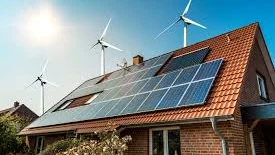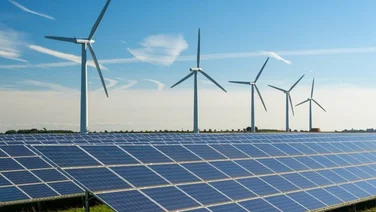- The UK produces just 10 megawatts of energy with low-carbon hydrogen
- Hydrogen boilers could be available in 2023
- Clean hydrogen is very expensive to produce
Hydrogen is one of the most important fuels in the UK’s drive to reach net zero emissions by 2050.
The UK government has already committed to a hydrogen strategy, so why does it feel like the hydrogen revolution is stalling?
We’ve answered that here by looking into what’s stopping it, whether the UK is producing hydrogen right now, and when we’ll switch to hydrogen-powered technology.

What is hydrogen and why is it important?
Hydrogen is the simplest and most abundant element in the universe, consisting of only one proton and one electron.
When produced cleanly, it’s one of the most eco-friendly forms of energy we have.
We can use it to power hydrogen boilers, fuel vehicles, and help in the production of ammonia, which is essential for growing food.
Other uses of hydrogen include generating electricity and using it in the manufacture of semiconductors and computer chips.
It’ll also help end reliance on fossil fuels, which in light of Russia’s invasion of Ukraine and the growing threat of climate change has become an even more important issue.
Germany, which up until Russia’s invasion was reliant (and still is to a large extent) on Russian gas, is looking to shift to using more hydrogen.
The UK on the other hand doesn’t get a lot of its gas from Russia, but hydrogen will still be an essential part of reaching net zero by 2050.
What are the different types of hydrogen production?
There are three main types of hydrogen — green, blue, and grey:
- Green hydrogen is produced by splitting water into hydrogen and oxygen, using renewable electricity. This is by far the most eco-friendly way to produce hydrogen
- Blue hydrogen is produced from natural gas and supported by carbon capture and storage. The UK’s hydrogen strategy sees blue hydrogen as a “low-carbon” energy source, which is a roundabout way of saying it still produces emissions
- Grey hydrogen is produced from natural gas and fossil fuels, making it the least environmentally friendly version of hydrogen

Is the UK currently producing hydrogen?
Right now, the UK is producing just 10 megawatts (MW) of energy with green and blue hydrogen gas, mainly in small, experimental trial projects.
That’s 500 times less than the amount the UK hopes to produce by 2030 — five gigawatts of energy from low-carbon hydrogen production.
The UK produces a lot more grey hydrogen — 27 terawatt hours (tWh), according to the Committee on Climate Change (CCC). This sounds like a lot, but in 2021 the UK’s total energy consumption was 11 times more than that, at 294.4 tWh.
And the CCC believes there’s still no serious plan for using green and blue hydrogen to decarbonise the UK’s heating systems.
Green hydrogen vs blue hydrogen
Clean hydrogen is one of the UK’s best solutions to our reliance on natural gas, but the core problem is that it’s not easy.
Green hydrogen requires electrolysis — the process of using electricity to separate hydrogen from oxygen. Large amounts of power are needed to do this, and right now the UK’s renewable energy infrastructure isn’t enough to effectively scale green hydrogen production.
It’s very expensive, too. A Nature study found it costs £3–£5 to produce a single kilogram of green hydrogen.
Compare that to blue and grey hydrogen, which costs £1.70 and £1.27 respectively, and the cost difference becomes clear.
From an environmentally friendly perspective, green hydrogen produced with electrolysis is the clear winner. Each kilogram of green hydrogen produced releases just 0.043 kg of carbon dioxide equivalent (CO2e).
Blue hydrogen emits 0.45 kg of CO2e per kilogram produced and grey hydrogen releases an unbelievably inefficient 11.1–13.7 kg of CO2e per kilogram.
Scale the CO2e produced by blue and grey hydrogen to the levels needed to power a country and the sheer amount of damaging emissions created boggles the mind.
For producing natural gas, 2.75 kg of CO2e is released — lower grey hydrogen, but still more polluting than blue hydrogen and a lot worse than green hydrogen.
What’s slowing down the UK’s switch to hydrogen?
Infrastructure
The huge amounts of infrastructure required to start a hydrogen revolution is among the chief reasons for the slow switch.
A network of processing facilities, storage tanks, and vehicles are all necessary for us to become a hydrogen-powered country and right now, there’s very little in place.
The UK government seems optimistic about it however, saying:
“As a result of its geography, geology, infrastructure, and capabilities, the UK has an
important opportunity to demonstrate global leadership in low-carbon hydrogen and to
secure competitive advantage.
“Building hydrogen production and enabling use across multiple sectors will be critical for developing domestic capacity and capabilities, and
securing green jobs across the UK.”
There are plenty of industry groups that doubt this sunny outlook. The Institute of Gas Engineers & Managers (IGEM) said huge investment would be needed to “provide the storage and flexibility we need to safely and securely meet the demands across industry, home heating, power generation and transport.”
Regen, a not-for-profit organisation that advises companies on clean energy, has an even more negative opinion of the UK’s hydrogen roadmap, calling it a “work in progress.”
Part of this pessimism comes from the hydrogen strategy focusing too much on “low-carbon” hydrogen, which effectively means hydrogen production that produces fewer emissions than existing fossil fuels.
Reaching net zero will be all but impossible if the UK is unable to make green hydrogen production the dominant method.
Funding
It’s no secret that funding is an issue too — just £240 million has been allocated to the Net Zero Hydrogen Fund, which barely scratches the surface.
The Hydrogen Council, a CEO-led initiative of companies looking to transition to clean fuels, reported that 30 countries now have hydrogen strategies, including the UK.
The group’s estimate is that by 2030, total funding for these strategies will be $300 billion (£252 billion), if all goes to plan.
That makes it clear that the initial funding for the UK’s hydrogen strategy is far below what’s needed if the UK is to become a global leader in hydrogen.
Production costs
Green hydrogen costs more to produce than either blue or green hydrogen. At £3–£5 to produce a single kilogram of green hydrogen, producing large amounts of it becomes very expensive.
Blue and grey hydrogen costs £1.70 and £1.27 respectively. It’s obvious that if green hydrogen is to become the dominant form of hydrogen, costs need to be reduced.
When will the UK switch from gas boilers to hydrogen boilers?
The earliest we’ll see hydrogen boilers is 2023, but we reckon it’ll be closer to 2025.
These boilers won’t be powered purely by hydrogen to start with — instead, the UK government has proposed boilers that run off of a blend of 20% hydrogen and 80% natural gas.
British Gas has said almost all new boilers will be able to use this blend, and the plan is to slowly shift towards a 100% hydrogen blend for the same boilers. Of course, this is dependent on the wider picture of infrastructure and production.
Will the UK use hydrogen to power vehicles?
Hydrogen-powered vehicles already exist in the UK, but in very limited numbers and models. In fact, there are only two models available now: the Toyota Mirai and the Hyundai NEXO.
Worldwide sales of these models combined are just 15,538 units. Figures for UK sales are unavailable, but you don’t need to put two and two together to work out the number would be low.
There are only 11 hydrogen-capable fuel stations in the UK as well, so even if you’re one of the lucky few to have a hydrogen car, refilling is going to be a challenge.
Electric vehicles have taken the spotlight instead, with massive surges in popularity over the past few years.
The Eco Experts’ first National Home Energy Survey further highlighted how keen UK residents are to buy an electric vehicle.
The survey showed 17% of UK residents plan to buy an EV within the next 12 months, and 69% would purchase an EV if money were no object.
Hydrogen-powered vehicles have an uphill battle if they’re to come close to rivalling the electric vehicle revolution, which despite global lithium shortages, shows no signs of stalling.
Summary
Hydrogen is an exciting prospect and if managed properly, will be a huge boon to the UK’s net-zero ambitions. To make this a reality, we need a massive policy shift in how the UK funds the hydrogen revolution.
The government must massively increase budgets for hydrogen infrastructure projects, introduce subsidies for early adopters of hydrogen boilers, and offer incentives for businesses.






